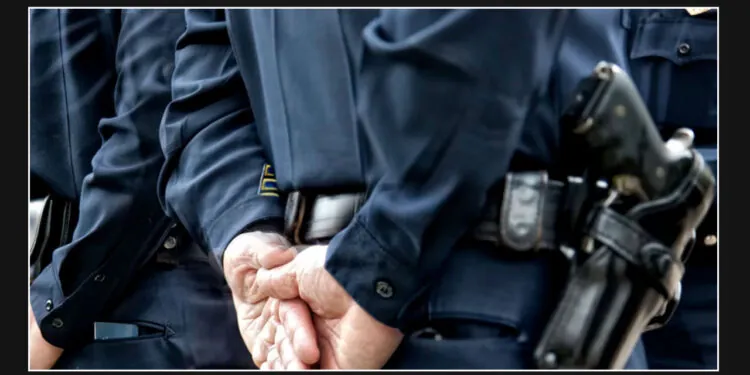An Indiana police officer, who was arrested for drunk driving but had the charge dropped and his record expunged, had his legal counsel argue before the state supreme court on Thursday that any pending disciplinary action related to the incident should not be permitted to proceed.
The law enforcement board in the state, which is responsible for handling disciplinary matters, disagreed with the notion that expungements are equivalent to gag orders. They argued that the board should have the authority to determine if an officer engaged in misconduct through its own proceedings.
The court documents identify the officer, who was arrested on July 5, 2021, as “R.L.”
The Hoosier sheriff’s office, who remains unnamed, notified Indiana’s Law Enforcement Training Board on August 4th, about the arrest of R.L. Currently, it is uncertain whether R.L. is still employed as an officer in Indiana.
According to court documents, the board notified the officer in April 2022 about an event that could potentially result in the revocation of his Indiana Law Enforcement Basic Training Certification and his authority to act as a law enforcement officer.
The story continues below.
The board accused R.L. of engaging in behavior that satisfied the criteria for Level 6 felony criminal confinement and Class C misdemeanor operating a vehicle with an alcohol concentration equivalent of .08 or higher.
In July 2022, R.L. petitioned to have all records related to his arrest expunged after receiving the letter. The Martin Circuit Court granted the request.
The officer responded to the training board, stating that he was only charged with operating while intoxicated, but the charge has now been dismissed. R.L. also argued that since the arrest has been expunged, the board should dismiss any disciplinary actions that could affect his ability to serve as a law enforcement officer.
The circuit court granted injunctive relief to R.L. after the board refused their request.
The law enforcement board appealed, and theIndiana Supreme Court of Appeals ultimately reversed the decision. They concluded that while the board cannot take into account expunged records during its proceedings, it is allowed to consider independent evidence that proves the officer’s involvement in the actions that led to the arrest.
Law enforcement board pushes back on lower court decision
According to Evan Comer, representing the state and the law enforcement training board, the board holds the authority to determine the evidence that should be taken into account during its proceedings.
The responsibility of determining whether or not R.L. committed misconduct lies with the board, not the trial court. The lower court’s intervention in the board’s process disrupted the administrative review process.
According to Comer, expungements should not be mistaken for gag orders or a means to erase the memories of witnesses or the harm caused by a defendant’s actions.
Comer argued that the main issue in this case revolves around one crucial point. The trial court’s directive to the board, preventing them from considering any information related to R.L.’s expunged arrest, was an improper interference with an independent disciplinary action conducted by the agency. According to Comer, the trial court’s decision effectively excluded evidence that could have been crucial for the board’s assessment, thus depriving the agency of its sole discretion in determining the facts.
According to Comer, R.L. should have first pursued all available administrative remedies before seeking recourse in the courts. If he had followed this course of action, there is a strong possibility that the officer could have effectively contested the admissibility of the evidence. As a result, the evidence would not have been allowed in the initial disciplinary hearing.
Expungements do not function as gag orders. They do not have the power to erase the memories of witnesses or eliminate the harm caused by the wrongdoings of a defendant.
“Evan Comer, an attorney representing the Indiana Attorney General’s Office, stated…”
Comer stated that if R.L. thought that his expungement would protect him from professional consequences for his misconduct, he could have raised this concern during the board’s proceedings.
The speaker raised an important question about granting second chances to certain individuals, while also considering the significant work and level of responsibility they hold. He acknowledged the lack of clear guidance from the General Assembly on this matter.
According to Comer, the act of forgiveness does not negate or erase the harm caused by an individual. To illustrate her point, she posed a hypothetical scenario involving someone named R.L. who was implicated in a case while coming from a grocery store. Comer questioned whether it would be appropriate to completely disregard R.L.’s presence at the grocery store and avoid holding him accountable for any actions he may have taken there.
The state highlighted the “uncharged conduct” that is the focal point of this disciplinary proceeding. Comer emphasized that this pertains to R.L.’s alleged criminal confinement of his wife on the same night as his OWI arrest. Despite the officer not facing charges for this particular crime, Comer argued that it remains relevant to the disciplinary proceedings of the law enforcement board.



